Duma Team Chyulu Update: 01 March 2010
Introduction.
Although Kenya's policy and legal framework provides for a firm foundation for sustainable forest management, there are shortfalls in implementation. Among other misuses of Natural Resources, the degradation of forests in Kenya continue, with little regard to the laws and the quality and importance of the forests. Kibwezi forest though small in size is the lifeline of thousands of people who depend on it for water,grazing and firewood. These benefits are attainable only if the communities realize the importance of the forest. The campaign to meet this objective is being done by KFS as well as The David Sheldrick Wildlife Trust both aiming to spark a participatory attitude from the local communities.
The Chyulu Team is still patrolling in conjunction with Mtito Team in order to train up the new Team Leader, Patrick Kimeu. Having the extra personnel has been rather helpful for the Chyulu Team and more ground has been covered during Patrols. The Teams patrolled from the 4th till the 30th of March.
Patrol objectives.
1. To have the Team dominate and gain control over the protection Kibwezi Forest from illegal exploitation. 2. To monitor Wildlife distribution and security. 3. To collect field data for Mapping and trend assessment.
Areas covered.
Kibwezi forest.
Participants. The members were:
CHYULU TEAM/UMANI MTITO TEAM James mbuthia Francis Chege Julius Kyalo Nterito Kapina Daniel Lekoiten Samuel Lolochuraki David Wambua Vincent mutua Muindi-KFS ranger. James Nyumu
Mwasia-KFS ranger. Patrick kimeu-under training
Findings.
TOTAL OF 10 ARRESTS
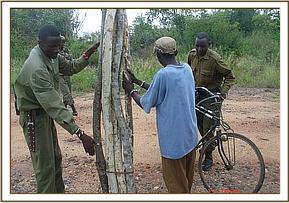

The 2 teams decided to set up a permanent operation base at Kenze which has proved to be the best decision to contain charcoal burning or poaching as the majority of the infiltration of people carrying out illegal activities comes from this area. This base is located at the foot of Kenze hill which also provides as an observation post for the teams. The teams concentrated on the 3 main charcoal burning and poaching hot spots, namely Kenze,Wayani, and Usalama areas. At Wayani area, 3 charcoal burners were arrested, 2 of them were from Ndeini Village, and the other from Mbui Nzau Village. All of the arrested were in possession of Charcoal heading to the Market for commercial sale.
The teams carried out Patrols at the Usalama village side of the forest where one logger was arrested. The pressure on the forest for wood consumption is high and most of the Charcoal sold along the main highway is manufactured from wood illegally harvested from this area.
Patrols in the Kenze area bore no arrests however the Teams did destroy many Charcoal Kilns which had been abandoned by people when news spread of the new camp base at Kenze which the Teams are operating from.
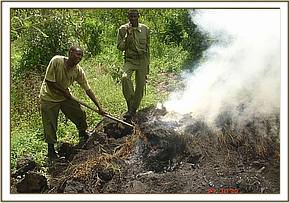
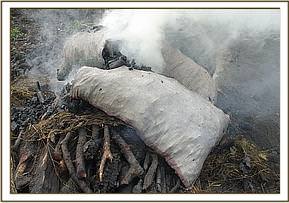
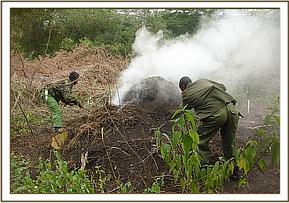
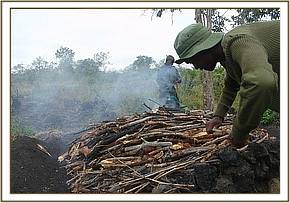

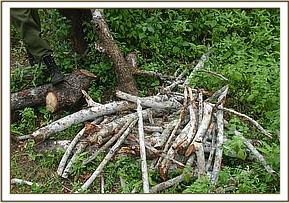

Observations & Summary
1. Most charcoal burners have moved out of the forest Kenze area and have migrated into the National Park. As such, 4 charcoal burners from Kalakalya Village were arrested in the park near Kenzili hill. The teams are following these changes in trends and hence Patrol into the Park in order to tackle the beginnings of any new illegal activities to prevent further destruction.
2. Our intelligence sources reveal that most of the people have gone either to Loitoktok for farming or Emali for charcoal burning. Indicating the Team¡¦s objectives are being met. 3. There has been shift in charcoal burning towards Mbuinzau hill about 3 kilometers from the forest boundary.
4. The most notorious charcoal burners are operating in the forest at night under moonlight.This has made the team members to sacrifice their sleep and follow them into the forest. Some have been arrested, and night patrols will carry on. 5. The employment of casuals at Umani Camp, forest boundary, and road clearing has yielded positive results.The Team has received on numerous occasion information from the casuals regarding the way the locals carry out their illegal activities. Employment of these men has also brought good will with the surrounding community. Their views are of the Trust staff being somewhat friends and they can benefit from the forest without destroying it. This is a huge step forward in the work of ensuring the long term survival of the forest.
6. KFS (Kenya Forest Service) office has witnessed a higher revenue collection as more people are paying for the services from the forest, which has been a system previously abused or resisted.
7. Many charcoal burners have publicly surrendered to the Team and promised to change their way and not enter the forest.
Although the general observations show the Team is meeting its targets & objectives within the protected Forest boundary there is some concern that some people are simply moving elsewhere to continue their illegal activities. Hence on the long run, it important to focus on education, job creation, & close community relationships to change the way in which people live. The Forest is an important part of the regions water system and hence securing this protected area is the first step to reaching these long term goals.
Community Outreach
Management Plan
The DSWT has contracted a professional to design a Management Plan for Kibwezi Forest. A stakeholders meeting was held at Kibwezi with assitance from the Chyulu Team leader. The forum provided valuable insights on the best way to manage the forest.
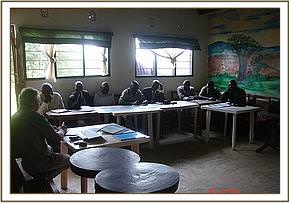
Desks donation
Wikiamba Primary School, one of the schools located near the Chyulu National Park, benefited from desks donation. The donation was gladly and gratefully accepted, the students were previously sitting on rocks or on dirt floors for their lessons at school. The function was well attended with the parents acknowledging the effort of the Trust in boosting education standards in the area. During the event the Team Leader emphasized on the importance of conserving nature and the dangers associated with the destruction of vital life sustaining natural resources.
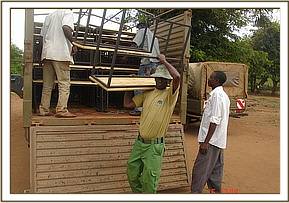
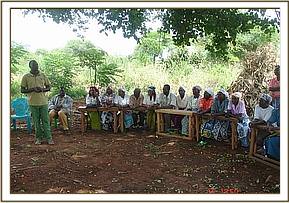
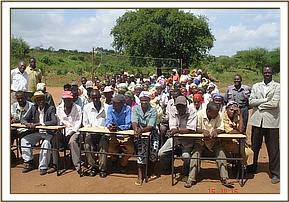

Kaunguni Primary School Trip
The school benefited with a school trip to tsavo west national park.The trip being the first of its kind to school was received with much appreciation and the children could not hide the joy of this experience.During the trip animals were seen and the team leader explained the importance and need of conserving wildlife.
Kithasyo Primary School Trip
A School Trip to the Park was granted to the children from Kithasyo Primary, all of whom had never visited the Park. This being their first experience, the trip was highly anticipated by the students. The excitement lasted throughout the day and provided a lasting positive impression in their lives. This trip also provided a platform for teaching the importance of Wildlife Conservation.
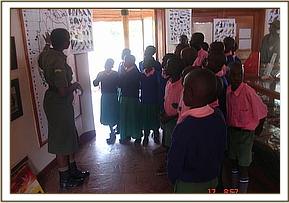
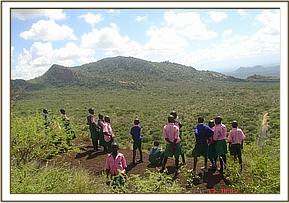
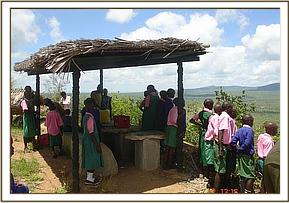

Fence Committee
The Team Leader joined forces with the local Forest Department to constitute a Fence Committee for the management of Kibwzi Forest. The fence will mitigate the challenges of human wildlife conflict as well as the general degradation of the forest. The committee comprises of members of the local community living close to the Forest boundary and will play an important role in the sensitization process of the community. The aim is to involve the local community so that they can fully participate in this important conservation cause.
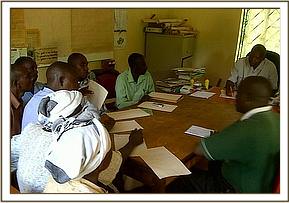
Road works
The opening of roads to increase the mobility of the desnaring team is in action. The team leader is making plans for the best the roads to be built that can be serve as both Patrol access routes and game drives for future guests of the Umani Springs Camp.
Video shows.
A video show was held at Kaunguni Primary School. This was the first film show in this remote village. The films shown where translated into Kamba language to ensure all understood the content, the message was very easy to grasp and the teachers requested for more such film screenings.
Radio Programme
The DSWT has become more aware that the media plays a big role in reaching the masses.By taking this advantage we recognize that the radio programmes can reach various ethnic groups in Kenya by passing conservation knowledge through the radio.So far I have aired the message to the people through the radio.Allot of people have been very responsive by asking questions relating to conservation.
Report by
James Mbuthia.